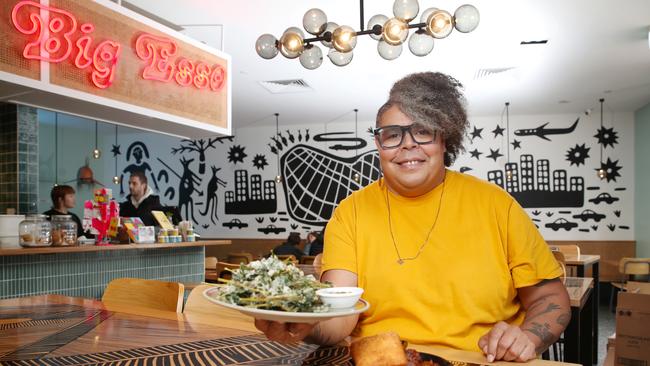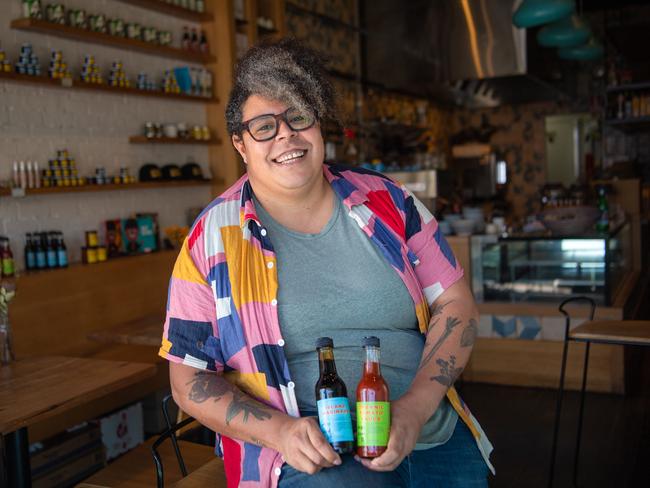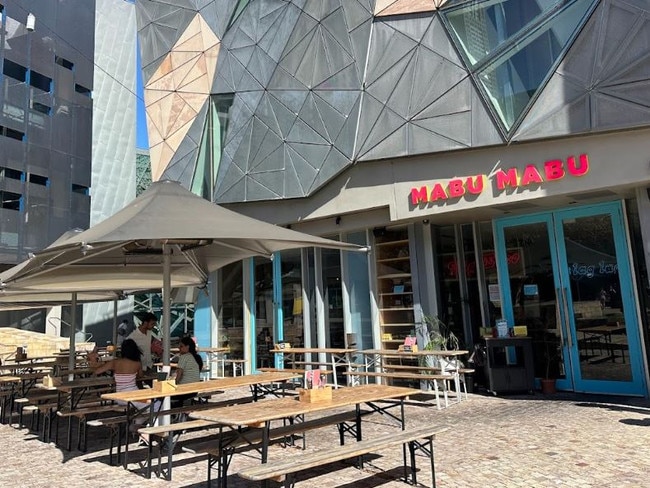Mabu Mabu accused of underpaying staff in lead up to collapse
Acclaimed Indigenous chef and food pioneer Nornie Bero has been accused of underpaying staff at her Federation Square restaurant Big Esso tens of thousands of dollars in superannuation in the lead up to its collapse.

News
Don't miss out on the headlines from News. Followed categories will be added to My News.
Acclaimed Indigenous chef and food pioneer Nornie Bero has been accused of underpaying staff tens of thousands of dollars in superannuation in the lead up to the collapse of her Federation Square restaurant.
The collapse of Big Esso, part of Bero’s Mabu Mabu hospitality group, has also sent a number of staff on sponsored temporary visas scrambling to find a new employer so they can remain in the country.
The Herald Sun has spoken to six Big Esso employees, who served in roles ranging from front of house, to kitchen and management, who say they are owed anywhere from $6,000 to more than $10,000 in unpaid super.
Their super, which collectively totals at least $175,000, has been unpaid for up to a year in some cases, one senior employee said.
The workers are also facing additional losses from unpaid entitlements linked to the collapse of Mabu Mabu which was put into liquidation this week.
Bero has won acclaim for championing Indigenous cuisine, fronting the Island Echoes cooking show on SBS and penning a cookbook that was short-listed in the Book of the Year Awards.
She first opened a pop-up stall at the South Melbourne Market in 2018 and followed this with the Mabu Mabu cafe in Yarraville in 2019.
Her biggest venture, all-day bar and kitchen Big Esso, opened in the heart of Melbourne’s CBD in 2021 offering up charred crocodile and emu steaks.

Big Esso employees told the Herald Sun they were left “completely blindsided” by the closure, with 40 staff abruptly sacked overnight.
“We were informed on Wednesday evening last week and by Thursday the restaurant was closed,” one worker said.
“There was no prior communication, no redundancy pay, no annual leave payouts and no superannuation paid – staff are collectively owed over $175,000 in super alone.”
More than half of the staff are immigrants, the insider said, with multiple workers employed on sponsored temporary visas now “left in limbo with no support”.
One worker told the Herald Sun he had only six months to find a new sponsor before being kicked out of the country.
“I’m owed more than a year worth of superannuation, over $10,000,” he said.
“I have to find a new sponsor soon, or else I’ll be forced to leave the country I love.”
Another employee on a sponsored visa said she is owed more than $9000 in super.
“I feel cheated,” she said.
“I have six months to find another sponsor. It’s not easy to find another, it is so stressful.
“I never thought that this would happen to me. I feel like a fool.
“You trust a company to pay you correctly. You don’t think this sort of thing is going to happen.”
Another worker claimed she hadn’t been paid superannuation since April last year.
“I’m owed around $6000 in super and $15,000 in entitlements,” she said.
“I’ve been working the last several years in hospitality in the hope of getting my permanent residency.
“The company promised me I’d be sponsored in the coming weeks.
“I’m a mum. I have a baby. And our future is unpredictable now and we don’t know what will happen.”

Ms Bero told the Herald Sun she was “blindsided” by the liquidation which was triggered when she changed accountants.
“I didn’t know we had to liquidate … my staff knew when I knew, that’s the honest truth,” she said.
“And the poor advice that we got from our original finances is that they didn’t guide us through the best way to manage this.
“I just brought in a new accountant and I met them for the first time and they’re telling me that I have to close my business.”
Ms Bero said all staff will be entitled to their superannuation.
“That will get done — that’s a given,” she said.
“I will personally guarantee that they will get all their entitlements.
“My love of people and community is one of my biggest things … I want to make sure I honour my suppliers and my staff and make sure that they get what they’re owed and make sure we can do that process.”
Ms Bero said the collapse of her business was a “very difficult situation” that she “wouldn’t wish upon anyone”.
“It’s hard to tell your team that they’ve lost their job in a blink of an eye, especially since I take them as a family, a village,” she said.
“I’ve had couples that work for me … and I’ve had to say to them, ‘I’m sorry, but your whole household doesn’t have money now’.
“It isn’t what I wanted. I’ve poured heaps of stuff into keeping us all alive.
“I’m trying to do things on the fly and learning along the way. I’ve never been in this situation before. It is one of those things that I have to try and manage day by day.”

The Herald Sun understands the move to place Mabu Mabu into liquidation was triggered by a debt to the Australian Taxation Office.
More than $235,000 is also understood to be owed to suppliers and in overdue rent to the Melbourne Arts Precinct Corporation.
“The lack of transparency and accountability in this situation is unacceptable, and we believe the employees’ voices need to be heard,” the senior employee said.
“Hospitality workers should not be treated this way, and we cannot allow another business to disregard its obligations to staff.”
Migrant Workers Centre chief executive Matt Kunkel said temporary migrant workers were excluded from the Fair Entitlements Guarantee – a government program that provides workers with financial assistance to recover unpaid employment entitlements – even though they pay taxes like everyone else.
“When businesses go under, they are left with nothing – no wages, no redundancy, no safety net. This must change,” he said.
“Temporary migrant workers help build Australia’s economy, yet they are denied the basic protections citizens receive, meaning that thousands of migrant workers are left without financial support and forcing many into financial hardship.”
Unpaid superannuation also isn’t protected under the scheme.
“The Australian Taxation Office is responsible for recovering it, but the process is slow, complex, and often unsuccessful – leaving workers empty-handed,” Mr Kunkel said.




